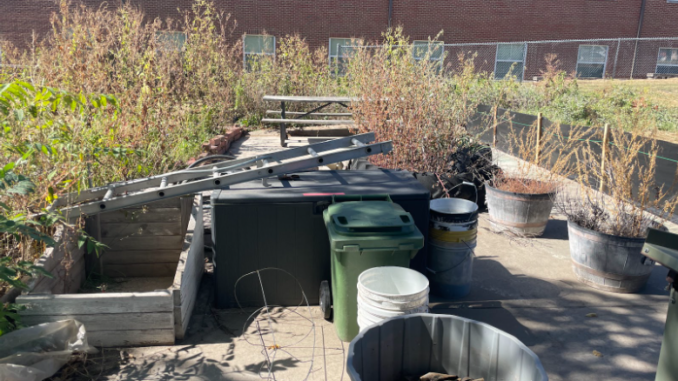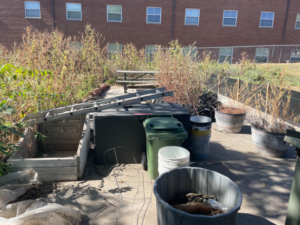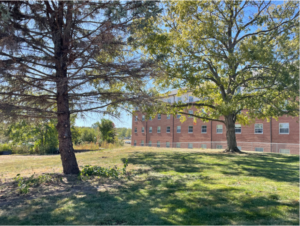
The Harry H. Laughlin house, referred to officially by Truman State University as the West Campus Annex, was demolished during summer 2023. This demolition caused the Communiversity Garden to miss their summer growing season and led them to find a new location for the garden.
According to the Communiversity Garden webpage, the organization began using the backyard of the house to plant produce available for students and faculty members during 2010. Last year, the Sustainability Office took control of the garden.
Paige Randolph, a junior volunteer for the Communiversity Garden, said the organization used the house for storage while the backyard housed the concrete pad, garden beds and picnic benches the organization had acquired through fundraising. Randolph said other sustainability groups on campus, such as the Compost Project and The Environmental Sustainability Fee Accountability Committee also helped with the garden.
“Last fall, I helped out with the Communiversity Garden. We bought new raised beds, we put mulch down and a number of students helped clear out and prepare the lot,” Randolph said. “And from what I can tell, Truman has still not said anything about demolishing the house.”
Randolph said she felt a bit blindsided by the demolition because, to her knowledge, the University never released a press statement or gave the volunteers any warning that this project was occurring.
Lori Shook, Campus Planner and Design Project Manager for the University, said she was not aware that an announcement had ever been released.
The demolition also took students who worked on the garden for their freshman Symposium class by surprise. Aria Thompson, a sophomore communication disorders major, said she and her classmates worked on the garden in their TRU 100: FEED class with agricultural science professor Dr. Bob Johnson.
“We were trying to address the food insecurity problem in Adair County through different ways. Some people worked on the farms picking vegetables to give to the food pantry, and others, like me, worked on the Communiversity Garden,” Thompson said. “I know a lot of us spent a lot of time working out there — we were writing to get grants for it, and we put a lot of time and effort into something that I thought was a really cool project for the community and for Truman.”
Like the Laughlin house, several other buildings on campus were originally privately-owned residential homes before the University purchased them as the campus expanded. Randolph said she thought buildings such as the Adair Building, Patterson House and others were privately owned before being bought out by the University.
Randolph said she worries that the demolition of the Laughlin house could potentially open the possibility of other historic houses being demolished. Randolph said she hopes the Laughlin house lot will be used to promote community and try and rectify the University’s past support of Laughlin.
“I totally understand that this is Truman’s property and they can do as they see fit,” Randolph said. “But what I would like to see is Truman taking a step against its past to try and correct it to promote diversity and inclusion and the ideas that we now stand for. I think a garden would be a great idea since agriculture and food production is something that all people need. Truman puts itself as a model for sustainability and environmental issues which, I think, draws in a lot of students, and this is now, quite literally, a new area for us to do that.”
Donna Liss, Chief Information Officer and the staff overseer of the garden, said the project was not being terminated but only changing locations. Liss said the plan was to find a new location by fall 2023, but since the growing season was already over the organization waited to make a decision and hopes to have a permanent location settled before next summer’s growing season.
Shook said the decision to demolish the house was made sometime last winter. Shook said the house was demolished because the University was still paying for insurance for the house even though it was not in use, and because the house also had asbestos, which is a common problem in historic houses. Asbestos is a group of minerals used to strengthen and building materials; however, inhaled asbestos fibers can result in diseases like mesothelioma or lung cancer.
“The demolition came about because obviously that building was unused for many years,” Shook said. “It’s the cost of having a building sitting there that really isn’t needed and is just falling in disrepair.”
Shook said the asbestos abatement was done by Asbestos Removal Services Incorporated of Callaway County, Missouri, while the actual demolition was done by Ahrens Contracting Incorporated of St. Louis, Missouri. Overall, Shook said the project cost the University around $91,000.
According to a website devoted to the house, The Laughlin house was located at 201 West Normal Street and was remodeled during 1941 by its namesake, Harry H. Laughlin. Laughlin lived in the house after its completion until his death during 1943. Laughlin was both an alumnus and faculty member of Truman and an infamous eugenicist whose scientific ideas were supported and practiced by the Nazis during World War II. The house was repurposed as the Northeast Missouri State University Child Development Center during 1971, before closing for good during 1993.
In past projects, students submitted suggestions for what they thought lots should be turned into. Students have proposed dog parks, parking lots and gardens in the past, but Shook said she is unsure if the University is currently accepting ideas. As of right now, there do not seem to be any plans for the lot other than turning it into green space.
Randolph encouraged students to get involved with other sustainability organizations on campus while the Communiversity Garden is out of commission. For information about the various environmental groups on campus, visit sustainability.truman.edu/get-involved/sustainability-organizations/.

The Communiversity Garden at the lot has become overgrown now that the organization must switch locations.

The lot has been seeded now that the house is demolished.
